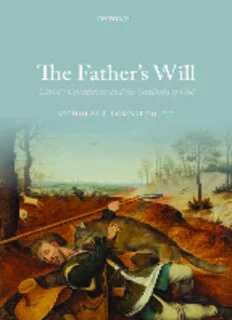
The Father's Will: Christ's Crucifixion and the Goodness of God PDF
Preview The Father's Will: Christ's Crucifixion and the Goodness of God
OUPCORRECTEDPROOF–FINAL,8/10/2013,SPi ’ THE FATHER S WILL OUPCORRECTEDPROOF–FINAL,8/10/2013,SPi OUPCORRECTEDPROOF–FINAL,8/10/2013,SPi ’ The Father s Will ’ fi Christ s Cruci xion and the Goodness of God NICHOLAS E. LOMBARDO, O.P. 1 OUPCORRECTEDPROOF–FINAL,8/10/2013,SPi 3 GreatClarendonStreet,Oxford,OX26DP, UnitedKingdom OxfordUniversityPressisadepartmentoftheUniversityofOxford. ItfurtherstheUniversity’sobjectiveofexcellenceinresearch,scholarship, andeducationbypublishingworldwide.Oxfordisaregisteredtrademarkof OxfordUniversityPressintheUKandincertainothercountries ©NicholasE.Lombardo,O.P.2013 Themoralrightsoftheauthorhavebeenasserted FirstEditionpublishedin2013 Impression:1 Allrightsreserved.Nopartofthispublicationmaybereproduced,storedin aretrievalsystem,ortransmitted,inanyformorbyanymeans,withoutthe priorpermissioninwritingofOxfordUniversityPress,orasexpresslypermitted bylaw,bylicenceorundertermsagreedwiththeappropriatereprographics rightsorganization.Enquiriesconcerningreproductionoutsidethescopeofthe aboveshouldbesenttotheRightsDepartment,OxfordUniversityPress,atthe addressabove Youmustnotcirculatethisworkinanyotherform andyoumustimposethissameconditiononanyacquirer PublishedintheUnitedStatesofAmericabyOxfordUniversityPress 198MadisonAvenue,NewYork,NY10016,UnitedStatesofAmerica BritishLibraryCataloguinginPublicationData Dataavailable LibraryofCongressControlNumber:2013938310 ISBN 978–0–19–968858–6 Asprintedandboundby CPIGroup(UK)Ltd,Croydon,CR04YY OUPCORRECTEDPROOF–FINAL,8/10/2013,SPi To my father, Gaetano Lombardo OUPCORRECTEDPROOF–FINAL,8/10/2013,SPi Christ’s passion, like a key, has opened for us the understanding of sacred scripture. —StephenLangton,CommentaryonMicah Jonah is a type of Christ. The ship is the synagogue of the Jews; the captain is Moses; the sailors are the prophets; the sea is the suffering that we all must undergo;thelotisthewilloftheFather,accordingtowhichChristwasthrown intotheseaofsufferingsandenteredthebellyofthegreatseamonsterofdeath. Thereheremainedforthreedays. —HesychiusofJerusalem,CommentaryontheMinorProphets OUPCORRECTEDPROOF–FINAL,8/10/2013,SPi Preface WhenChristianshearthestoryofJesusinthegardenofGethsemane,asking for his cup to pass from him, but then surrendering to the Father’s will, they often think of their own lives, and their own suffering. They know instinctively that the Father’s will for Jesus sheds light on the Father’s will forthem.TheyknowthatJesus’sufferingilluminatestheirsuffering,andthat the reason Jesus takes up his cross somehow relates to the reason they must take up theirs. Accordingly, theologies of redemption do not simply offer solutionstoatheologicalpuzzle.Theyanswernumerousexistentialquestions. Ofthese,thequestionthatmattersmostisfairlysimple:isGodtheFatherwith me as I take up my cross, or is he orchestrating my crucifixion? This book works towards a theology of redemption that can safeguard the goodness of Godagainstanyappearanceof divineinjustice,andthusaffirmthatGodthe Fatherisalwayswithus,alwaysonourside. The best way forward, this book argues, lies in the recovery of the ancient theological category of ransom. According to the early Christians, Christ’s crucifixion was a ransom that liberated us from the powers of evil, sin, and death.Thetheologicalcategoryofransomhaslongsincebeeneclipsed,butit is the preferred category of the New Testament for interpreting the specific event of the crucifixion; it also lies at the etymological origins of the word “redemption” (in Latin, the word for ransom is redemptio). The category of ransom has many advantages. It frames the drama of salvation as a straight- forwardstoryofgoodtriumphingoverevilanddeath.Itmakesthegoodness ofGodmoreevident.ItalsomakesiteasiertoseeGodtheFatherastheauthor ofoursalvation,ratherthanasternjudgewhomustbeplacated.Andsincethe categoryofransomtracesbacktoJesus’sayingintheGospelsaboutgivinghis life “as a ransom for many” (Mark 10:45; Matt 20:28), it has great claim to interpretthecrucifixioninthewayJesushimselfinterpretedit. ByapproachingthecrucifixionfromtheperspectiveoftheFather’swill,this book also addresses the place of God the Father in Christian theology and culture.ManytheologiesofredemptioninadvertentlyputGodtheFatherina negativelight.ThesetheologiesmakeitmoredifficulttorelatetohimasJesus relates to him in the Gospels. They also contribute to the ambivalence that some Christians feel about addressing God as Father. This book offers a corrective to such theologies. It takes as its point of departure Jesus’ words to Philip: “He who has seen me has seen the Father” (John 14:9). There is no mercy visible in the Son that was not present first in the Father, and any theology that would give the slightest impression otherwise must be OUPCORRECTEDPROOF–FINAL,8/10/2013,SPi viii Preface rejected—charitably, but firmly. What is at stake is nothing less than being able to hear the Father’s words at Jesus’ baptism spoken also to us, as they in fact are, through our baptism: “You are my beloved Son; with you I am well pleased” (Mark 1:11). * * * Thisbookisthefruitofmanyconversations,anditisaprivilegeandapleasure to offer my thanks and appreciation to all those who through their words and support have helped bring it to completion. Above all, I would like to thank Janet Martin Soskice, under whose supervision this book began as a doctoralthesisattheUniversityofCambridge,forherencouragement,insight, and guidance. I would also like to thank John Proctor, who supervised my work on the initial drafts of the scripture chapters with great generosity, and David Ford and Karen Kilby, my examiners, for their comments and suggestions. I am also grateful to the Dominican community of Blackfriars, Cambridge, for their warm welcome, and for making my stay in England thoroughlyenjoyable. Alongthewaymanyreaddraftsorportionsofthemanuscript,andIwould like to express my great appreciation to all those who shared with me their comments, criticisms, and suggestions. While the flaws of this book remain entirelymyown,theirgenerosityhassparedbothmyreadersandmyselffrom many errors, and their thoughtful comments significantly inspired and clari- fied mythinking.Iamparticularlygrateful toNicholasIngham,O.P., forhis detailed comments on the manuscript at multiple stages. I am also very grateful to Margaret Atkins, O.S.A., Amanda Perreau-Saussine Ezcurra (who sadlydiedlastyear),KevinFlannery,S.J.,FergusKerr,O.P.,WilliamMattison, FrancescaAranMurphy,BenedictViviano,O.P.,BruceWilliams,O.P.,andan anonymousreaderforOxfordUniversityPress. Many others read various sections and chapters, and for their comments, suggestions,andquestionsIwouldalsoliketothankRosemaryBoyle,Clem- entBurns,O.P.,RomanusCessario,O.P.,MarkClark,SarahCoakley,Barna- basDavis,O.P.,PhilipDevine,HughVincentDyer,O.P.,GillesEmery,O.P., Boniface Endorf, O.P., John Ford, C.S.C., Ky Heinze, Andrew Hofer, O.P., AidanNichols,O.P.,BrianKennedy,MatthewLevering,WilliamLoewe,Peter Martens, MicheleRansil,C.D.P.,StephenRyan,O.P.,Eleonore Stump,Cath- erine Tkacz, Robert Sokolowski, Justin Taylor, S.M., Tarmo Toom, Joseph Vnuk, O.P., Susan Wessel, Thomas Joseph White, O.P., and Celia Wolf- Devine. Parts of this manuscript were presented in papers and lectures, and I am grateful for the questions and comments received afterward. Special thanks are also owed to Michele Ransil, C.D.P., for her exceptional (and exceptionally speedy) proofreading, and the late Louis Bataillon, O.P., who, immediately after hearing me describe the topic of my research, shared with methequotationfromStephenLangtonthatservesasthefirstofitsepigraphs. OUPCORRECTEDPROOF–FINAL,8/10/2013,SPi Preface ix As mentioned above, this book is the fruit of many conversations. In a specialway,itisthefruitofconversationswithmyfather.WhatIhavelearned from him has made everything else possible. This book is dedicated to him withgratitudeandadmiration. NicholasE.Lombardo,O.P. TheCatholicUniversityofAmerica Washington,D.C. May2013
Description: